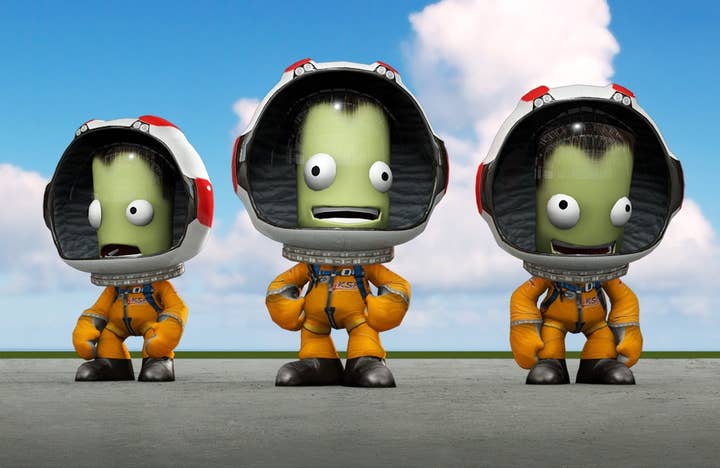Community is a double-edged sword
Kerbal Space Program's director of PR on the power of fans, and why building community goes a lot further than forums
Squad's Kerbal Space Program is a hit. While the developer doesn't disclose sales figures, the Steam Early Access sandbox space simulation last summer boasted more than 43,000 daily active users. And as anyone who has made a habit of browsing the Steam storefront since the game's March 2013 debut knows, Kerbal Space Program has frequently been a featured title and regular inhabitant of the best-seller section. As for what made the game a hit, Squad director of PR Bob Holtzman told GamesIndustry International it's due to the fanbase.
"The community is the reason why KSP has been successful," Holtzman said. "Not that the development team isn't awesome, but it's that relationship that we've been able to nurture...This is just something I've seen going on with games since I've started working, and it really comes down to how well the developers and community can work through their potential issues to make the game better and make people more excited about it."
While an engaged and passionate community can help an Early Access game on both the marketing and development fronts, it is not completely free from drawbacks.
"You're going to have a reputation that you're going to have to uphold to a certain extent if you want your community to move it forward or pay it back."
"It's a double-edged sword," Holtzman said. "If you upset them or turn them off, you're just not going to get anywhere."
There are two areas specifically where running afoul of a fanbase like Kerbal Space Program's would come back to bite the developer
"If our community is unhappy with us, they're going to let us know," Holtzman said. "And that means other people will know, so that means our reputation is on the line. You're going to have a reputation that you're going to have to uphold to a certain extent if you want your community to move it forward or pay it back, however you want to see it."
Beyond that, Squad relies almost entirely on the fanbase to get the word out about Kerbal Space Program.
"We don't spend money on traditional marketing, per se. At least, we haven't to this point. So you've got a situation where we really rely on our players to serve as our megaphone," Holtzman said.
Fostering community means a lot more than just going on forums. While Holtzman said it's important to listen to the people on forums and interact with them, he said it's crucial to understand they are a vocal minority. For example, the Kerbal Space Program forums comprise less than 5 percent of the total player base.
"This is pretty much for every game I've ever worked on, when you go to the forums, you walk away feeling kind of bad," Holtzman said. "Like, I've really upset a lot of people and we're doing a lot wrong. Luckily, in today's day and age you have a lot of options."
Some of those options have benefits beyond good word-of-mouth. For example, Kerbal Space Program has benefitted from a healthy modding community, YouTube Let's Play videos, Twitch streaming, and its own active Subreddit.
"We really love Reddit because we feel it gives us a much more broad understanding of what's going well and what our community's doing with the game," Holtzman said, adding, "You get a nice viewpoint and it's not the same five, 10, or 20 people that are just really emotionally charged about that issue."
The benefits of Kerbal Space Program's community interaction are further boosted by its Early Access business model. By releasing the game earlier in development, the feedback loop between users and creators kicks in right away. Players start giving their feedback at a point where the developers can still change the direction of the game to better suit the fanbase's requests.

"For an indie developer who probably doesn't have the full game finished, that gives you a fighting chance to make a bigger, better game than if you just put it out," Holtzman said. "And if you just put it out, it's such a big risk. What if you're close but you're not there, and people don't pick it up? What if you're well off the mark? You don't really have a second chance to fix it. With KSP, these guys were able to really invest in what the community had to say, take those ideas and apply them to the game."
Because Kerbal Space Program was not developed in a vacuum, Holtzman said the game Squad will wind up with will be very different than the one they set out to make. But there's also a strong likelihood the game will be more successful for the changes in vision. Holtzman may attribute that success primarily to the community, but that sort of devotion from a playerbase doesn't happen on its own. Instead, he said the process of building a strong community falls somewhere between catching lightning in a bottle and following a proven formula.
"First and foremost, you have to have a game they're going to want to be passionate about. If you don't, you're DOA," Holtzman said. "The second thing I think is that you've got to be engaging with them. You've got to be listening to them and talking to them. You have to create a dialog. If you're not doing those things, it's probably more lightning in a bottle. But communities change, too. So you've got times where you get hot, and what do you do with it? You've got to be ready to adapt to them, and they're going to be adapting to your game."









